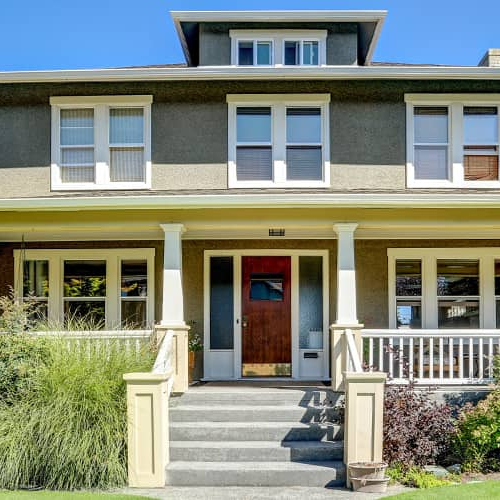What is the average mortgage payment in North Carolina?
Contributed by Tom McLean
Aug 30, 2025
•6-minute read

North Carolina is an attractive place to live for a diverse range of households. With in-demand cities like Charlotte, Raleigh-Durham, and Asheville, North Carolina has an active real estate market that could lead you to a new home.
Whether you’re planting roots in the Blue Ridge Mountains or settling near the coast, having realistic expectations for the cost of living will help you plan wisely and avoid surprises. Here’s a closer look at the North Carolina real estate market and the average mortgage payment in N.C.
Overview of the North Carolina housing market
According to the National Association of REALTORS®, the median home price in North Carolina is $425,000 as of June 2025. That’s an increase of 25% over the same month five years ago, and a whopping 71% increase over the past nine years.
Over the last calendar year, Charlotte had the sixth-largest population increase nationwide. Five municipalities were among the top 100 nationwide for population increase, while seven were among the top 100 fastest-growing as a percentage of population. In addition, 82% of municipalities either grew or had their population remain stable, a trend that suggests further growth in housing prices.
Average monthly mortgage payments by county
North Carolina is home to 100 counties. The average monthly mortgage varies dramatically by county, and even within counties, everyone’s mortgage payment and financial situation is unique.
| County |
Median Monthly Payment |
|---|---|
|
Wake County |
$2,880 |
| Orange County | $2,830 |
| Union County | $2,670 |
| Chatham County | $2,670 |
| Mecklenburg County | $2,640 |
| Buncombe County | $2,600 |
| Dare County | $2,550 |
| Durham County | $2,520 |
| New Hanover County | $2,380 |
| Henderson County | $2,270 |
| Cabarrus County | $2,240 |
| Moore County | $2,210 |
| Brunswick County | $2,170 |
| Currituck County | $2,160 |
| Iredell County | $2,130 |
| Lincoln County | $2,100 |
| Carteret County | $2,060 |
| Transylvania County | $2,020 |
| Johnston County | $1,940 |
| Watauga County | $1,930 |
| Pender County | $1,910 |
| Camden County | $1,740 |
| Franklin County | $1,730 |
| Harnett County | $1,710 |
| Gaston County | $1,700 |
| Polk County | $1,690 |
| Guilford County | $1,660 |
| Forsyth County | $1,660 |
| Rowan County | $1,640 |
| Catawba County | $1,630 |
| Madison County | $1,610 |
| Alamance County | $1,600 |
| Onslow County | $1,580 |
| Clay County | $1,580 |
| Haywood County | $1,550 |
| Jackson County | $1,520 |
| Davie County | $1,460 |
| Lee County | $1,450 |
| Granville County | $1,410 |
| Stanly County | $1,410 |
| Avery County | $1,400 |
| Davidson County | $1,390 |
| Craven County | $1,380 |
| Macon County | $1,370 |
| Cleveland County | $1,370 |
| Pitt County | $1,360 |
| Burke County | $1,340 |
| Pasquotank County | $1,340 |
| Ashe County | $1,330 |
| Yancey County | $1,330 |
| Randolph County | $1,320 |
| Cumberland County | $1,300 |
| Caldwell County | $1,300 |
| Wilson County | $1,270 |
| Perquimans County | $1,270 |
| Swain County | $1,260 |
| Pamlico County | $1,260 |
| Rutherford County | $1,250 |
| Cherokee County | $1,250 |
| Chowan County | $1,230 |
| Mitchell County | $1,210 |
| Nash County | $1,200 |
| Alexander County | $1,200 |
| Alleghany County | $1,190 |
| Hoke County | $1,190 |
| Stokes County | $1,160 |
| Person County | $1,160 |
| Wilkes County | $1,100 |
| Wayne County | $1,100 |
| Beaufort County | $1,090 |
| Yadkin County | $1,090 |
| Surry County | $1,090 |
| Rockingham County | $1,070 |
| McDowell County | $1,010 |
| Gates County | $980 |
| Graham County | $930 |
| Caswell County | $910 |
| Montgomery County | $900 |
| Vance County | $880 |
| Tyrrell County | $830 |
| Sampson County | $770 |
| Columbus County | $770 |
| Bladen County | $750 |
| Warren County | $750 |
| Jones County | $740 |
| Duplin County | $740 |
| Hyde County | $720 |
| Richmond County | $720 |
| Anson County | $710 |
| Greene County | $690 |
| Edgecombe County | $670 |
| Lenoir County | $670 |
| Hertford County | $670 |
| Scotland County | $660 |
| Martin County | $660 |
| Washington County | $640 |
| Northampton County | $610 |
| Halifax County | $610 |
| Bertie County | $570 |
| Robeson County | $520 |
How do mortgage payments in North Carolina compare with other states?
Home price is one of the most significant factors in the average mortgage payment. As of July 2025, the median listing price in North Carolina is $425,000, ranking 26th among all states.
Among all North Carolina counties, the median monthly mortgage payment is $1,325. The nationwide median is around $1,500–$1,600, which makes North Carolina modestly more affordable than the average state.
What affects mortgage payments in North Carolina?
Several factors influence the monthly payment amount for homeowners with a mortgage. Here are the most significant factors.
Home prices in N.C.
The base amount used to calculate a mortgage payment is how much the owner borrows. The more you can put down on a mortgage, the less you have to borrow, both overall and relative to the price of the home.
With a median listing price of $425,000, the typical starting mortgage loan balance in North Carolina would be $382,500, assuming a 10% down payment. FHA loans and VA loans allow you to borrow more if you qualify, but that also leads to a higher monthly payment.
Interest rates
Mortgage rates rise and fall based on a range of market factors, including the target interest rate set by the Federal Reserve. North Carolina mortgage rates can change daily. Your credit history plays a significant role in the rate you pay when approved for a mortgage.
You can get an estimate of your rate if you were to get a new mortgage or refinance in North Carolina, or any other state, in just a few minutes with Rocket Mortgage.
As of this writing, the national average rate for a 30-year fixed mortgage is 6.75%, according to Freddie Mac. Over the last 12 months, rates have varied from 6.08% to 7.04%.
Taxes and insurance
Property taxes and homeowners’ insurance are often paid alongside the mortgage loan with an escrow account. Escrow includes annual local property taxes and homeowners’ insurance, split into 12 monthly payments instead of a smaller number of larger payments.
According to the Tax Foundation, North Carolina ranks 33rd for property taxes as a percentage of average home value. Plan to pay around 0.62% of your home’s value per year. If you buy a house in a high-cost neighborhood, you may see a much larger monthly average tax bill than in less expensive communities.
Regional differences
Major metro areas, such as Charlotte and Raleigh, continue to command higher home prices due to strong demand, robust economic growth, and limited inventory. The average monthly mortgage payment in Wake County, where Raleigh is located, exceeds $2,800. In more rural areas, buyers may find that North Carolina housing costs are significantly lower. Eleven counties in North Carolina have a monthly average mortgage rate of less than $700.
North Carolina-specific mortgage resources for home buyers
North Carolina offers several helpful mortgage resources for homeowners. Eligibility varies based on income and location.
- NC Home Advantage Mortgage: Administered by the North Carolina Housing Finance Agency, the NC Home Advantage Mortgage offers down payment assistance to first-time and move-up home buyers. You can get down payment assistance worth up to 3% of the loan amount.
- NC 1st Home Advantage down payment: First-time or military veteran homeowners may be eligible for up to $15,000 in down payment assistance through this program.
- Community home buying programs: The North Carolina Housing Finance Agency offers multiple community home buying programs. These include down payment assistance and affordable mortgages, provided qualifying income is met.
- NC Home Advantage Tax Credit: This state tax credit offers savings to qualifying homeowners who borrow with a mortgage in North Carolina.
- Local and specialized assistance programs: You may also find local county or city resources, and nonprofit and religious organizations that offer financial assistance if you’re facing a short-term financial challenge.
FAQ
Here are answers to common questions about mortgage payments in North Carolina.
How much income do you need to afford a home in North Carolina?
To comfortably afford a home in North Carolina, you’ll generally need to earn at least $60,000 – $85,000 annually, assuming a 10–20% down payment and a moderate debt load. When assessing your ability to afford a mortgage, lenders consider your credit score, down payment, other debts, and total monthly debt and housing payments in relation to your income.
The Rocket housing affordability calculator can quickly help you understand the cost of a home with a mortgage loan.
Do mortgage payments differ by county in North Carolina?
In North Carolina, mortgage payments vary significantly by county due to differences in home values, property taxes, and insurance costs. Wake and Mecklenburg counties are larger metro areas and are ranked among the more expensive parts of the state. Rural areas offer more affordable homes and lower monthly mortgage payments.
What is a good mortgage rate in North Carolina right now?
A “good” N.C. mortgage rate varies for each individual and depends on their credit score, loan type, and market conditions. According to Freddie Mac, the average mortgage rate nationwide is 6.75% as of the time of this writing. You can find the latest Rocket Mortgage rates here.
The bottom line: What you’ll pay on your North Carolina mortgage depends
If you’re planning to buy a home or refinance in North Carolina, keeping track of market rates can help you decide on the right time to move forward with a new loan. In addition to home prices, your personal finances and credit history play a significant role in determining your North Carolina mortgage payment.
Whether you’re a first-time buyer or an experienced homeowner, working to lower your mortgage payment and understanding when to get your next mortgage are key to your financial health and success.

Eric Rosenberg
Eric Rosenberg, is a financial writer, speaker, and consultant based in Ventura, California. He holds an undergraduate finance degree, an MBA in finance, and is a Certified Financial Education Instructor (CFEI®). He is an expert in banking, credit cards, investing, cryptocurrency, insurance, real estate, business finance, and financial fraud and security.
He has professional experience as a bank manager and nearly a decade in corporate finance and accounting. His work has appeared in many online publications, including USA Today, Forbes, Time, Business Insider, Nerdwallet, Investopedia, and U.S. News & World Report.
Related Resources

5-minute read
What is the average mortgage payment?
Wondering what you can expect for your monthly mortgage payments? Learn about the average mortgage payment and the factors that affect it.
Read more

10-minute read
How much house can you afford?
Ever asked, “How much house can I afford?” Determine how much you can spend on a mortgage with help from the Rocket Mortgage home affordability calc...
Read more
6-minute read
How to use a mortgage calculator
Learn how to use our mortgage calculator to determine your monthly mortgage payments, including PMI, taxes, insurance, down payment, interest rate and more.<...
Read more